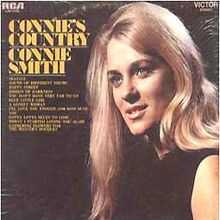Connie's Country
| Connie's Country | ||||
|---|---|---|---|---|
 | ||||
| Studio album by Connie Smith | ||||
| Released | April 1969 | |||
| Recorded |
February 27, 1967; December 1968 (RCA Victor Studios, Nashville) | |||
| Genre | Country | |||
| Label | RCA Victor | |||
| Producer | Bob Ferguson | |||
| Connie Smith chronology | ||||
| ||||
| Singles from Connie's Country | ||||
|
||||
| Professional ratings | |
|---|---|
| Review scores | |
| Source | Rating |
| Allmusic | |
Connie's Country is the twelfth studio album by American country music artist, Connie Smith. The album was released in April 1969 on RCA Victor Records and was produced by Bob Ferguson. It was Smith's first album release in 1969 and contained the single, "Ribbon of Darkness," which became a major hit.
Background
Connie's Country was recorded at the RCA Victor Studio in Nashville, Tennessee between February 1967 and December 1968. The album consisted of twelve tracks of newly recorded material by Smith. Some of songs on the album were cover versions, including Perry Como's "Seattle", Merle Haggard's "Today I Started Loving You Again," and Marty Robbins's "Ribbon of Darkness." The album was released on a 12-inch LP album, containing six songs on each side of the record. The album was reviewed by Allmusic, which gave it a rating of four in a half out of five stars,[2] a higher rating than her previous two albums in 1968 (I Love Charley Brown and Sunshine and Rain). In addition, unlike any of Smith's previous albums, none of the songs were written by Bill Anderson or Dallas Frazier, who had also written many of Smith's previous hits.
Release
Connie's Country only released one single, her cover version of "Ribbon of Darkness." Released in February 1969, the song became a major hit in the United States, reaching #13 on the Billboard Magazine Hot Country Songs chart, while also becoming her first #1 single on the Canadian RPM Country Tracks chart. The album itself also reached a peak position. Connie's Country reached a peak of #14 on the Billboard Top Country Albums chart upon its official release in 1969.[3]
Track listing
Side one
- "Seattle" – (Jack Keller, Hugo Montenegro, Ernie Sheldon)
- "Ribbon of Darkness" – (Gordon Lightfoot)
- "Gotta Lotta Blues to Lose" – (Jimmy Gateley)
- "Today I Started Loving You Again" – (Merle Haggard, Bonnie Owens)
- "You" – (Jimmy Holder)
- "I'll Love You Enough (For Both of Us)" – (Ray Griff)
Side two
- "Sound of Different Drums" – (Harlan Howard)
- "Happy Street" – (Ben Peters)
- "Blue Little Girl" – (Betty Jean Robinson)
- "Lonely Woman" – (Alda Calogne, Jean Chapel)
- "You Don't Have Very Far to Go" – (Haggard, Red Simpson)
- "Gathering Flowers for the Master's Bouquet" – (Marvin E. Baumgardner)
Personnel
- Byron Bach – cello
- Brenton Banks – violin
- Howard Carpenter – viola
- Jerry Carrigan – drums
- Dorothy Dillard – background vocals
- Ray Edenton –guitar
- Johnny Gimble – fiddle
- Solie Fott – violin
- Buddy Harman – drums
- Priscilla Hubbard – background vocals
- Lillian Hunt – violin
- Roy Huskey – bass
- Charles Justice – fiddle
- Martin Katahn – violin
- John Kline – viola
- Shelly Kurland – violin
- Charlie McCoy – electric bass, harmonica
- Piere Menard – violin
- Weldon Myrick – steel guitar
- Louis Nunley – background vocals
- Dean Porter – guitar
- Hargus "Pig" Robbins – piano
- Connie Smith – lead vocals
- Roby Story – violin
- Leo Taylor – drums
- Gary Vanosdale – viola
- Bill Walker – vibes
- Lamar Watkins – guitar
- Harvey Wolfe – cello
- William Wright – background vocals
Sales chart positions
- Album
| Chart (1969) | Peak position |
|---|---|
| U.S. Top Country Albums | 14 |
- Singles
| Year | Song | Chart positions | |
|---|---|---|---|
| US Country | CAN Country | ||
| 1969 | "Ribbon of Darkness" | 13 | 1 |
References
- ↑ Allmusic review
- ↑ "Connie's Country > Overview". allmusic. Retrieved 2009-08-10.
- ↑ "Charts & awards". allmusic. Retrieved 2009-08-10.